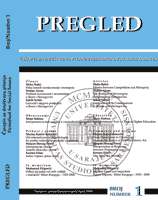Evropski principi i organi uprave u Bosni i Hercegovini
European Principles and Administrative Bodies in Bosnia and Herzegovina
Author(s): Huso KičićSubject(s): Law, Constitution, Jurisprudence
Published by: Univerzitet u Sarajevu
Keywords: Bosnia and Herzegovina; European Union; public administration; rule of law; judiciary; sustainable economic and social development
Summary/Abstract: Bosnia and Herzegovina, as well as other Southeast European countries applying for membership in the European Union must carry out reform of their public administration and administrative bodies, to meet the criteria for accession which were agreed in Copenhagen and Madrid. Most areas of government are covered or are directly affected by acquis communautaire (entire legislationof the European Union). In different aspects of acquis, goals and purpose of the reform are quite clear. Countries that apply for membership need to make EU legislation a part of their national legal system, and then implement and apply it. Through time democratic countries have reached general consensus on the key components of good government. These components include principals of rule of law, liability, predictability, responsibility and transparency, as well as technical and governing capability, organizational capability and participation of citizens. Despite the lack of acquis communautaire, this consensus resulted in principles for public administration which were accepted by EU member states with different legal traditions and different systems of government. Since the establishment of the European Union, these principles have been defined and refined several times through decisions of national courts, and then through the legal system of the European Court of Justice. The principles of public administration adopted by EU member states comprise the conditions of the European administrative area. Countries applying for accession to the European Union, including Bosnia and Herzegovina, need to take into account all these standards in the process of creation and development of their public administration. Although the European administrative area does not represent a continuation of acquis communautaire, it can still serve as a model for public administration reform in countries applying for EU membership. The extent and scope to which the countries applying for EU membership adopt these public administration principles and respect the standards of the European administrative area indicates the ability of their public administration to effectively implement acquis communautaire in accordance with the criteria that the Council of Europe clearly defined in Copenhagen and Madrid. The capacities of public administration in Bosnia and Herzegovina (BiH) have increased in the last twelve years, and in that way each level of government has become more capable of fulfilling its basic responsibilities. Through time, the expectations of citizens have increased as well. Providing basic public administration alone is no loner enough; all the citizens expect sustainable economic and social development as part of EU membership. In order to meet the demands of citizens and move BiH closer to EU structures, public administration needs to go through a process of improvement and reform.
Journal: PREGLED - časopis za društvena pitanja
- Issue Year: XLIX/2008
- Issue No: 1
- Page Range: 107-136
- Page Count: 30
- Language: Bosnian

